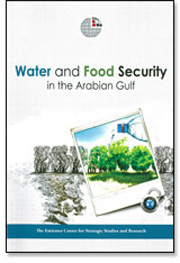Book contents
- Frontmatter
- Contents
- Figures and Tables
- Abbreviations and Acronyms
- Foreword
- Introduction
- Keynote Addresses
- Water Security in a Changing World
- 1 Water Security: Supplies, Resources, and Uncertainty
- 2 Challenges Facing the Management of Water Resources
- Water Security in the Arabian Gulf Region
- Water Resource Management in the Arabian Gulf Region
- Regional and International Food Security
- Water and Food Security in the UAE
- Contributors
- Notes
- Bibliography
- Index
2 - Challenges Facing the Management of Water Resources
from Water Security in a Changing World
Published online by Cambridge University Press: 05 September 2014
- Frontmatter
- Contents
- Figures and Tables
- Abbreviations and Acronyms
- Foreword
- Introduction
- Keynote Addresses
- Water Security in a Changing World
- 1 Water Security: Supplies, Resources, and Uncertainty
- 2 Challenges Facing the Management of Water Resources
- Water Security in the Arabian Gulf Region
- Water Resource Management in the Arabian Gulf Region
- Regional and International Food Security
- Water and Food Security in the UAE
- Contributors
- Notes
- Bibliography
- Index
Summary
Water is the lifeline of our planet. Across various cultures, we share a common perspective with regard to water as a symbol of reconciliation, healing and regeneration. Water is not only essential for sustaining human life, but also important for public health, food and energy production, and hence the prosperity of our society. Despite this common perspective, however, there is no global consensus on standards for important indicators such as the minimum per capita requirement for water. Various organizations and researchers have advocated different standards, ranging from 20 liters per capita per day (lpcd) for basic domestic health and hygiene needs (according to the United Nations Children's Fund [UNICEF] and the World Health Organization [WHO]), to 4,651 lpcd of drinking water for active and healthy human life by the Water Assessment Program. As Chenoweth1 rightly points out, existing estimates of human water requirements based on specific quantities of water for basic domestic functions are much lower than those based upon water quantities actually used by a modern society which utilizes its water resources relatively prudently, and are at least an order of magnitude lower than actual water requirements for satisfying domestic, industrial and agricultural needs.
Chenoweth also estimated, using a self-proclaimed, more theoretical approach, that 135 lpcd is required for achieving high human development. This estimate has become more relevant in the context of the recent announcement that the Millennium Development Goals' (MDG) target on water, “to halve, by 2015, the proportion of the population without sustainable access to safe drinking water,” has been achieved three years ahead of the timeline.
- Type
- Chapter
- Information
- Water and Food Security in the Arabian Gulf , pp. 37 - 58Publisher: Emirates Center for Strategic Studies and ResearchPrint publication year: 2013



